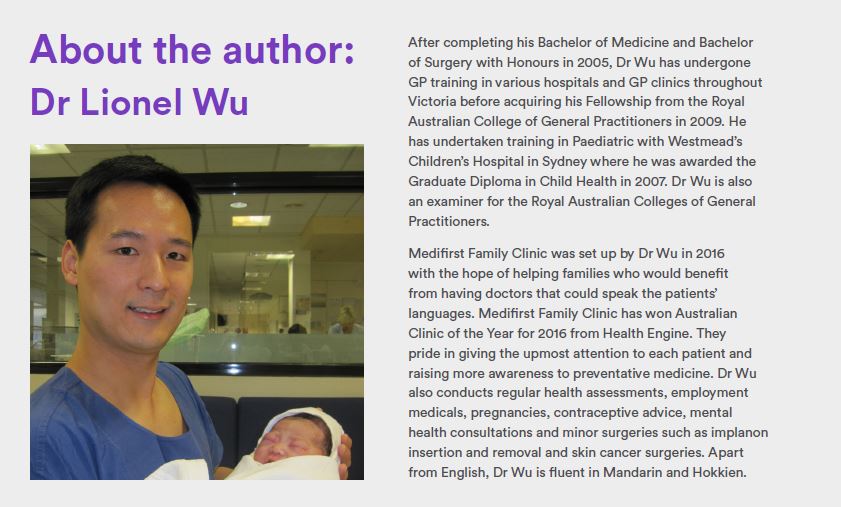Every step of the way
Written by Dr Lionel Wu.
 |
Dr Lionel Wu is a General Practitioner with extensive paediatric training. |
Very often, pregnancy is a life-changing and emotional journey for parents, especially young couples expecting their first child. So I personally take great satisfaction in helping them navigate through this journey. I see my role as being their first port of call, in a medical sense – someone who is there to guide them every step of the way. As they sit in my office, and the news is confirmed, I congratulate them, I let them enjoy the moment, and then together we begin to plan.
We see quite a lot of young families at Medifirst Family Clinic. In fact, they make up about 80 per cent of our general patient population.
Managing the pregnancy together
For the first-time mum, I begin with an overview of how we will manage the pregnancy together. This includes a timeframe of when to undertake all the different tests and procedures, including the ultrasound.
It’s at this point that I will advise screening for genetic disorders like Down’s Syndrome or Turner’s Syndrome in the form of NIPT. I always tell parents that tests like these are optional, and not compulsory. Then, we go through the pros and cons. I encourage them to discuss prenatal testing with their partner and whether it is something they would like to proceed with.
I am a big believer in preparedness. For example, for any patient that comes to our clinic, we will check their blood pressure, their cholesterol – so we can identify their heart attack risk. Then, if it is high, we will work together to plan, to prepare, and if possible find a solution.
It’s the same with pregnancy. It’s always good to know what the possibilities may be, and that is why I recommend NIPT to every single mother – without exception. And, in my experience, nine out of 10 patients agree to it. If cost is an issue, I will suggest the traditional test – which is one third of the price, but it’s less accurate, and the patients do not find out the gender.
NIPT and high-risk results
Generally, most mums will have a low risk result. But what if the test is positive?
That’s when I explain to them that this is the very reason we undertake the test – so that they can have professional genetic counselling and guidance through the options. It allows an opportunity to plan our next step, to consider what we are going to do. If they have very strong beliefs, I remind them that this is about putting us in the best position to plan for the future and not necessarily about ending the pregnancy.
That is why I think prenatal testing represents another way of offering assurance to our patients. When medical professionals like us think about the benefits of antenatal screening, we often think of words like “monitoring” and “detection”. But I often use words such as “awareness” and “preparation”.
Every pregnancy, every birth is a miracle. Parents want to be assured that everything will be ok. NIPTs keep them informed. The tests are not just to detect the risk of genetic disorders like Down’s Syndrome or Turner’s Syndrome but to also give parents an awareness – an understanding of what future difficulties and challenges there could be for their new family. This prepares them and makes them emotionally ready for their baby’s birth.
Then the focus can turn to education and planning. It’s important they know there are interventions in place; help is available. The first three months after delivery is such a chaotic time, and it’s easy to become overwhelmed. Tests like Harmony allow issues to be detected early on and, irrespective of one’s beliefs, it’s always good to get that counselling. And I believe that Clinical Labs offers very good, free genetic counselling.
Ongoing GP involvement
As a GP, I want to be involved in the patient’s journey from start to finish. So, if a test reveals a patient as ‘high-risk’ and they are subsequently referred to genetic counselling, my involvement continues and, in many respects, takes on a far more proactive role.
In the event of a miscarriage, for example, after informing the patients of the results, I let them have time to grieve, and then I invite them back, when they are ready, for more testing – another scan, another blood test – to make sure they are physically and, more importantly, emotionally ready. Then, together, we plan their next pregnancy.
Nobody likes to be the bearer of bad news, but it’s something we all train in as med students – and I would hate to think that this would deter GPs from offering or suggesting these tests to parents. Similarly, GPs shouldn’t perceive these conversations to be solely the obstetrician’s area of concern.
As GPs we are fortunate to have such a central, and trusted, role in a parent’s birth journey. So we shouldn’t regard positive test results as a potential threat to a good doctor-patient relationship. Instead, we should approach the process as a natural step in the patient-doctor journey – and continue to assist in a journey that we are very privileged to have been invited to share.

To find out more information about NIPT and what Clinical Labs can offer please visit our website www.clinicallabs.com.au/nipt



